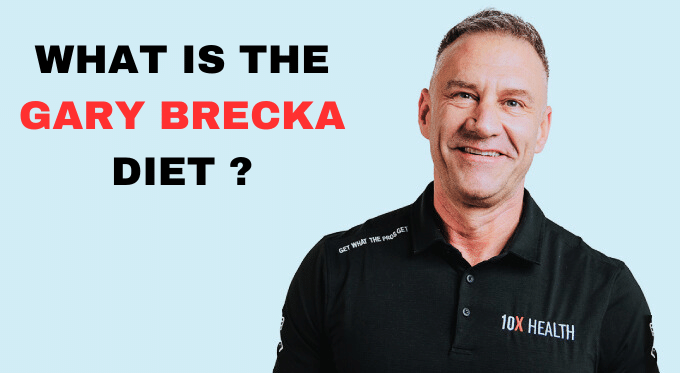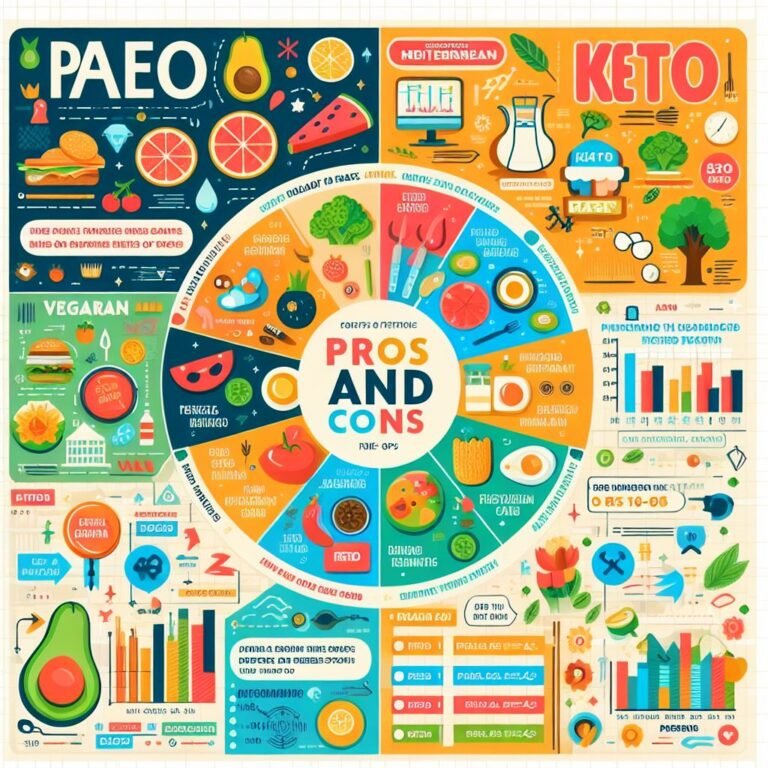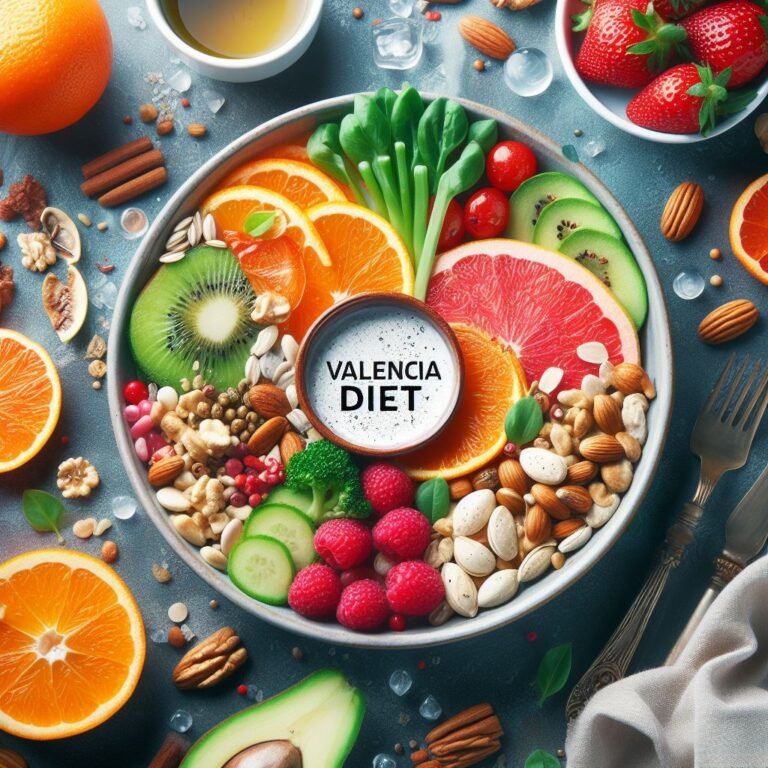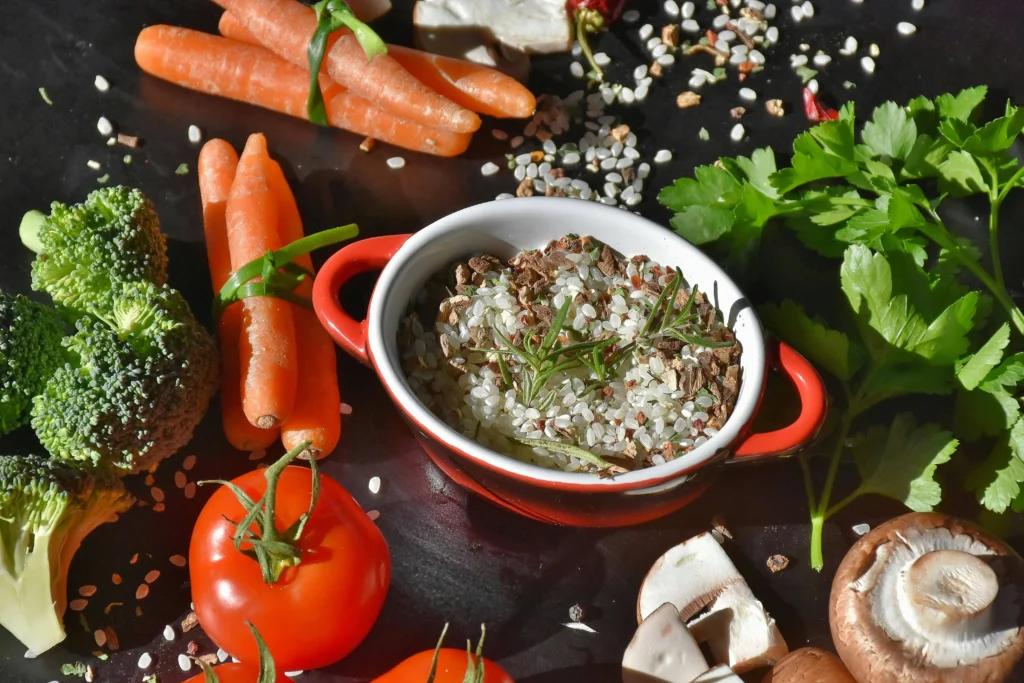
Attention health-conscious readers seeking a revolutionary approach to wellness: have you heard of the ketotic diet? This groundbreaking fusion of two powerful dietary strategies – the ketogenic diet and biotic augmentation– is transforming how we approach weight loss and overall health optimization.
Imagine achieving metabolic harmony while fostering a thriving gut ecosystem, all within the confines of one comprehensive plan. Intrigued? Delve deeper into this innovative dietary paradigm shift as we uncover the science behind ketosis, microbial balance, and their symbiotic relationship. Prepare to embark on a journey towards vitality and vitality with the ketobiotic diet.
Table of Contents
What is a Ketobiotic Diet?
The Ketobiotic diet combines the keto diet and a diet that helps your gut. This helps with weight loss, metabolism, gut, and overall health.
The diet focuses on getting your body into ketosis by eating low-carb foods. It also includes foods that support a healthy gut. This gives a full approach to improving both metabolism and digestion.
Understanding Keto and Probiotics
Explanation of the Ketogenic Diet
The ketogenic diet, or keto diet, is a high-fat, low-carbohydrate eating plan designed to induce ketosis. By reducing carbs and eating more fats, the body changes how it gets energy. Instead of using glucose, the body starts burning fat for fuel.
Importance of Probiotics for Gut Health
Probiotics are live microorganisms that confer various health benefits when consumed in adequate amounts. They play a crucial role in maintaining the balance of gut bacteria, supporting digestion, immune function, and even mental health.
Science Behind Ketobiotic Diet
In the ketobiotic diet, the science behind ketosis and probiotics intertwines to produce synergistic effects. While the ketogenic diet promotes fat-burning and weight loss, probiotics contribute to gut health and overall well-being.
Benefits Of The Ketobiotic Diet
The Ketobiotic diet offers a range of potential benefits for overall health and well-being:
- Enhanced Weight Loss: By promoting ketosis and utilizing fat as the primary fuel source, the Ketobiotic diet can aid in weight loss efforts. Additionally, the emphasis on nutrient-dense foods helps control hunger and calorie intake.
- Improved Blood Sugar Control: The Ketobiotic diet is low in carbohydrates, which helps to keep blood sugar levels stable, making it a good option for people who are insulin resistant or have diabetes. This can result in improved insulin sensitivity and glycemic control.
- Optimal Gut Health: Ranking foods that nourish the gut microbiome, such as fiber-rich vegetables and fermented foods, can lead to a diverse and balanced microbiome. This, in turn, supports better digestion, and immune function, and reduces the risk of digestive disorders.
- Increased Energy and Mental Clarity: Many people report experiencing increased energy levels and improved mental clarity on the Ketobiotic diet. By utilizing fat for fuel instead of carbohydrates, the body can maintain steady energy levels without fluctuations.
- Potential Longevity Benefits: Emerging research suggests that both ketosis and a healthy gut microbiome may have longevity-promoting effects. By combining these two dietary approaches, the Ketobiotic diet may offer potential benefits for healthy aging and longevity.
Foods To Eat In a Ketobiotic Diet
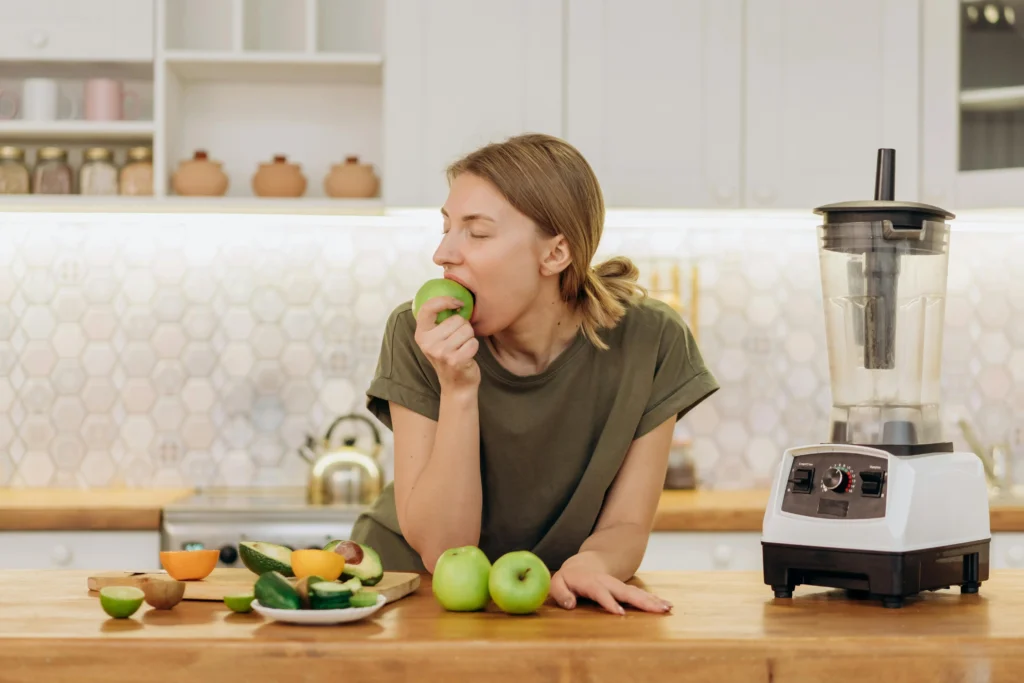
When following a Ketobiotic diet, focus on integrating the following foods:
- Healthy Fats: Include plenty of healthy fats in your diet, such as avocados, olive oil, coconut oil, nuts, and seeds. These fats provide essential nutrients and help keep you feeling full and satisfied.
- Non-Starchy Vegetables: Load up on non-starchy vegetables like leafy greens, broccoli, cauliflower, zucchini, and bell peppers. These vegetables are rich in fiber, vitamins, and minerals while being low in carbohydrates.
- Fermented Foods: Incorporate fermented foods like sauerkraut, kimchi, kefir, and yogurt into your diet to support a healthy gut microbiome. These foods are rich in beneficial probiotics that promote digestive health.
- Lean Proteins: Choose lean sources of protein such as poultry, fish, eggs, and tofu. Protein is essential for muscle repair and growth and can help keep you feeling full between meals.
- Low-Carb Fruits: Enjoy small servings of low-carb fruits like berries, avocado, and tomatoes. These fruits provide free radical scavengers and fiber while keeping your carbohydrate intake in check.
Eating these foods on your Ketobiotic diet helps your body get important nutrients, keeps your gut healthy, and makes you feel your best.
Foods To Avoid In Ketobiotic Diet
A ketobiotic diet is a combination of both the keto diet and the probiotic diet. The aim is to improve gut health while keeping you in ketosis. Here are some foods to avoid:
1. High-carb Foods: Foods high in carbohydrates should be limited or avoided, including:
- Grains such as wheat, rice, barley, and oats.
- Starchy vegetables like potatoes, corn, and peas.
- Sugary fruits such as bananas, grapes, and mangoes.
- Processed foods containing added sugars or refined grains.
2. High-Sugar Foods: Foods with high sugar content can disrupt gut health and spike blood sugar levels, hindering ketosis. Avoid:
- Sugary snacks and desserts like candies, cookies, cakes, and pastries.
- Sweetened beverages including soda, fruit juices, and energy drinks.
- High-sugar condiments like ketchup, barbecue sauce, and sweetened salad dressings.
3. Processed and Artificial Foods: They often contain ingredients, preservatives, or unsaturated fats that can have adverse effects on gut health and metabolism. Do not consume:
- Processed meats like hot dogs, sausages, and deli meats that contain added sugars, fillers, and preservatives.
- Artificial sweeteners like aspartame, sucralose, and saccharin.
- Highly processed vegetable oils like soybean oil, corn oil, and sunflower oil.
4. Highly Processed Dairy: Some dairy products can be consumed in moderation, but it’s best to steer clear of those that are highly processed or high in added sugars. Limit or avoid:
- Sweetened yogurts, flavored milk, and ice cream.
- Processed cheese spreads and cheese products with added ingredients.
5. High-Carb Alcoholic Beverages: Alcoholic drinks can disrupt ketosis and may contain hidden sugars and carbohydrates. Limit or avoid:
- Beer, cider, and sweetened cocktails.
- Sugary liqueurs and mixed drinks.
- 6. Certain Fruits: Fruits that are low in sugar can be eaten in moderation, but some fruits are high in carbs and should be avoided:
- Tropical fruits like pineapple, bananas, and mangoes.
- Dried fruits are concentrated sources of sugar and carbs.
7. High-Carb Nuts and Seeds: While nuts and seeds are usually healthy, some have more carbohydrates. These should be eaten in moderation:
- Cashews and chestnuts are higher in carbs compared to almonds, walnuts, and pecans.
Avoid foods that don’t help ketosis or gut health. Focus on whole foods that are high in nutrients. This will help you get the most from your keto diet.
Full-Day Meal Plan For Ketobiotic Diet
Breakfast:
- Scrambled eggs cooked in grass-fed butter or coconut oil with spinach, mushrooms, and bell peppers.
- Avocado slices on the side.
- Bulletproof coffee or tea made with MCT oil or coconut oil and grass-fed butter or ghee.
Lunch:
- Grilled chicken or salmon served on a bed of mixed greens (spinach, kale, arugula) with olive oil and vinegar dressing.
- Side of steamed broccoli or cauliflower.
- Half an avocado or guacamole for additional healthy fats.
Dinner:
- You can use zucchini noodles or spaghetti squash. Top them with homemade marinara sauce. The sauce has tomatoes, garlic, onion, and herbs. You can add grilled shrimp or tofu on top.
- Side salad with mixed greens, cherry tomatoes, cucumbers, and avocado, dressed with olive oil and lemon juice.
- Steamed asparagus or roasted Brussels sprouts.
Remember to adjust portion sizes and ingredients according to your individual macronutrient needs and dietary preferences. It’s smart to talk to your doctor before starting a new diet plan. This is especially important if you have any medical conditions. Your doctor can help make sure the diet is safe for your health.
Ketobiotic Recipes
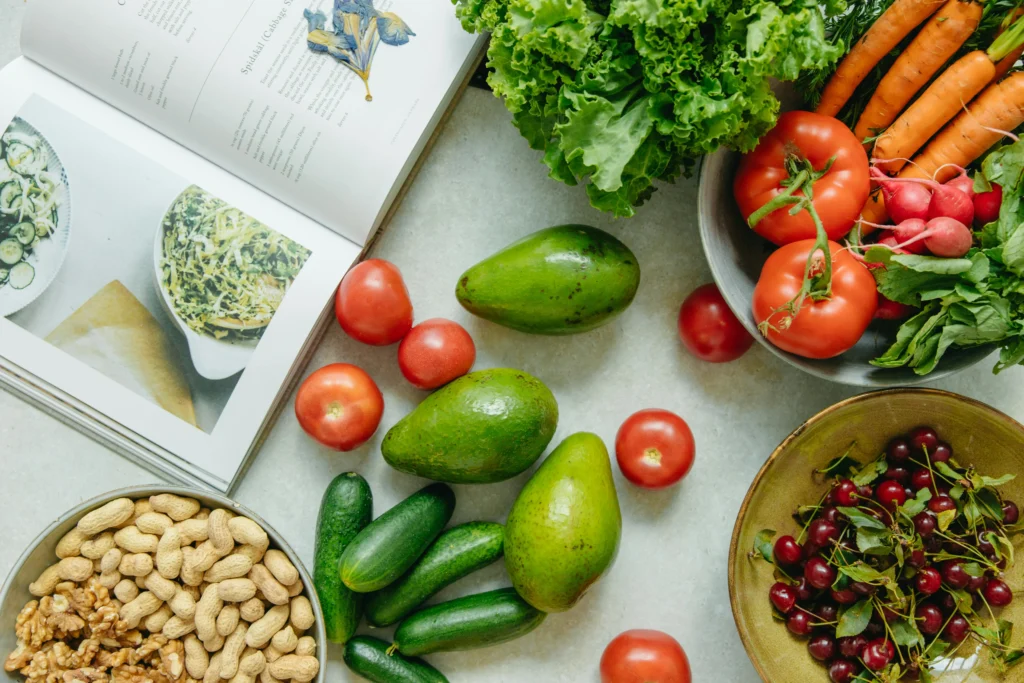
Try these delicious Ketobiotic-friendly recipes to support your health and well-being:
Avocado and Spinach Salad
Ingredients:
- Fresh spinach leaves
- Avocado, diced
- Cherry tomatoes, halved
- Cucumber, sliced
- Olive oil
- Lemon juice
- Salt and pepper
Instructions:
- In a large bowl, combine spinach, diced avocado, halved cherry tomatoes, and sliced cucumber.
- Drizzle with olive oil and lemon juice.
- Season with salt and pepper to taste.
- Toss gently to combine and serve.
Grilled Salmon with Asparagus
Ingredients:
- Salmon fillets
- Asparagus spears
- Olive oil
- Garlic, minced
- Lemon zest
- Salt and pepper
Instructions:
- Preheat the grill to medium-high heat.
- Drizzle salmon fillets and asparagus spears with olive oil.
- Season salmon with minced garlic, lemon zest, salt, and pepper.
- Grill salmon for 4-5 minutes per side, or until cooked to your desired doneness.
- Grill asparagus for 2-3 minutes per side, or until tender.
- Serve grilled salmon and asparagus together for a delicious and nutritious meal.
Coconut Chia Pudding
Ingredients:
- Chia seeds
- Coconut milk
- Vanilla extract
- Unsweetened shredded coconut
- Berries for topping
Instructions:
- In a bowl, combine chia seeds, coconut milk, and a splash of vanilla extract.
- Stir well to combine and let sit for 10 minutes.
- Stir again to prevent clumping, then refrigerate for at least 2 hours or overnight.
- Before serving, sprinkle with unsweetened shredded coconut and top with fresh berries.
These Ketobiotic recipes are tasty and healthy. They give your body important nutrients. They also help your gut stay in good shape. Incorporate them into your meal plan to reap the benefits of the Ketobiotic diet.
Potential Risks and Side Effects
While the ketobiotic diet offers many benefits, it’s essential to be aware of potential risks and side effects, including:
- Keto Flu: During the first few hours, some people may feel sick. They might have headaches, feel tired, and feel frustrated.
- Digestive Upset: Rapid changes in diet can sometimes cause digestive discomfort, including bloating, diarrhea, or constipation.
- Nutrient Deficiencies: A ketogenic diet can lead to vitamin and mineral deficiencies if not followed correctly.
Success Stories and Testimonials
Countless individuals have experienced remarkable transformations and health improvements on the ketobiotic diet. From dramatic weight loss to increased energy levels and improved digestion, these endorsements speak for themselves.
Tips for Long-Term Success
To sustain the benefits of the ketobiotic diet, consider:
- Variety and Moderation: Incorporate a diverse range of foods to ensure adequate nutrient intake and prevent dietary boredom.
- Regular Monitoring: Keep track of your progress and adjust your diet as needed to maintain ketosis and gut health.
- Lifestyle Factors: Remember that diet is just one aspect of overall health. Prioritize sleep, stress management, and physical activity for optimal well-being.
Frequently Asked Questions (FAQs)
1. What are the best probiotic foods for a ketobiotic diet?
- Probiotic-rich foods such as yogurt, kefir, sauerkraut, and kimchi are excellent choices for a ketobiotic diet.
2. Can I still have dairy on a ketobiotic diet?
- Yes, but opt for full-fat dairy products like cheese and yogurt, which contain beneficial fats and probiotics.
3. How long does it take to see results on a ketobiotic diet?
- Your results may vary depending on a few things, but most people see a change in their energy levels and digestion within two weeks.
4. Are supplements necessary for a ketobiotic diet?
- While supplements can be helpful, they aren’t always essential if you’re getting all your nutrients from whole foods.
5. Can I drink alcohol while on a ketobiotic diet?
- Eating small amounts of alcohol like dry wine or spirits may work well with a keto diet. But avoid drinking too many sugary cocktails or beer.
Conclusion
To summarize, the keto-probiotic diet combines the keto and probiotic approaches. This helps you lose weight and improve your gut health. Eating a balanced diet rich in fat, protein, and probiotics helps weight loss, digestion, mood, and overall health.

